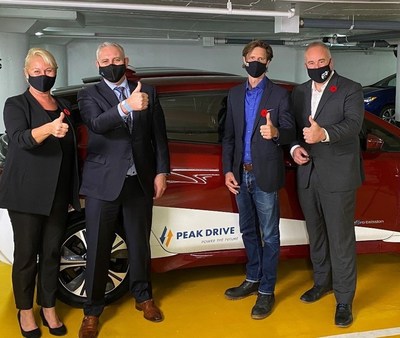Newsroom
The program leverages two-way Vehicle-to-Home charging technology to provide back-up power during outages
TORONTO, Nov. 10, 2021 /CNW/ - Today, Hydro One and Peak Power launched a new pilot program to study the benefits of using electric vehicle (EV) charging technology to improve power resiliency and reliability for customers. Two-way Vehicle-to-Home (V2H) charging technology will be installed at the homes of program participants to test the ability of EVs to act as batteries and provide back-up electricity through simulated power outages. This technology has the potential to support the shift to electrification and a low-carbon economy for customers in Ontario. As part of building a grid for the future, the innovative pilot program will study how this technology can improve the reliability of Hydro One's distribution system.
"At Hydro One, we are committed to meeting the needs of our customers and providing exceptional service. As a leader in the integration of clean energy resources, we are making smart investments in our electricity system to enhance power resiliency," said Jason Fitzsimmons, Chief Corporate Affairs and Customer Care Officer, Hydro One. "Our partnership with Peak Power and the IESO will help us explore how this technology can lower costs and improve service for our customers."
"We're thrilled to be working with Hydro One as a utility partner who shares our passion for pioneering clean energy innovation to benefit their customers and help support the reliability, affordability and sustainability of Ontario's grid alongside growing EV adoption," said Matthew Sachs, Chief Operating Officer, Peak Power. "This V2H project will demonstrate how utilities and system operators can integrate intelligent clean tech to modernize their grid with cost-efficient software solutions."
The pilot program is funded in part by the Independent Electricity System Operator's (IESO) Grid Innovation Fund. The fund supports projects that either enable customers to better manage their energy consumption, or reduce costs associated with maintaining reliable operation of the province's grid.
"We are enthusiastic about the potential for EVs to evolve beyond just consuming energy to become active contributors to the grid in ways that increase reliability and cut costs," said Lesley Gallinger, President and Chief Executive Officer, Independent Electricity System Operator. "Ontario is gearing up for a period of significant demand growth coupled with increasing pressure on supply. We see EV owners as potential partners in the system – being a part of the solution to meet Ontario's long-term energy needs."
Peak Power will leverage its software demonstrated in its existing Peak Drive pilot in partnership with Nissan and the Federal Government to explore the benefits of V2H two-way charging. This technology is already being used with Nissan Leaf EVs in Japan, Europe and Australia.
"Nissan has always been a supporter of measures that help encourage electric vehicle adoption so we're happy to see pilot programs like this that raise awareness around the potential of electric vehicles," said Nissan Canada. "Sustainability and electric vehicles are an important part of the future and Nissan will continue to offer customers EVs, like the Nissan LEAF and upcoming all-new Ariya electric crossover, to continue to push the EV industry forward."
Vehicle-to-Grid technology can cut costs and emissions and power a home for approximately three days, with enough battery in reserve to drive to a recharging site.
Hydro One Limited (TSX: H)
Hydro One Limited, through its wholly-owned subsidiaries, is Ontario's largest electricity transmission and distribution provider with approximately 1.4 million valued customers, approximately $30.3 billion in assets as at December 31, 2020, and annual revenues in 2020 of approximately $7.3 billion.
Our team of approximately 8,700 skilled and dedicated employees proudly build and maintain a safe and reliable electricity system which is essential to supporting strong and successful communities. In 2020, Hydro One invested approximately $1.9 billion in its transmission and distribution networks, and supported the economy through buying approximately $1.7 billion of goods and services.
We are committed to the communities where we live and work through community investment, sustainability and diversity initiatives. We are designated as a Sustainable Electricity Company by the Canadian Electricity Association.
Hydro One Limited's common shares are listed on the TSX and certain of Hydro One Inc.'s medium term notes are listed on the NYSE. Additional information can be accessed at www.hydroone.com, www.sedar.com or www.sec.gov.
Our website is www.HydroOne.com. Follow us on facebook.com/hydrooneofficial, twitter.com/hydroone and instagram.com/hydrooneofficial.
Peak Power
Peak Power is a Canadian Clean Technology company building AI-powered solutions that make building owners and operators part of the clean energy transition. Working with real estate, energy, and transportation partners, Peak Power transforms buildings and industrial facilities from static energy consumers into dynamic, two-way grid resources that generate revenue. Climate contributors become climate solution providers – and get paid to do so. The company's technology optimizes commercial buildings through the intelligent management of energy use, energy storage, and EV-grid integration. Peak Power's solutions are deployed in over 15 million square feet of commercial real estate, controlling 90+ MWh of battery and electric vehicle capacity in Ontario, New York, and California. Peak Power's clean energy solutions help facility owners and operators prepare for a future that is environmentally and economically sustainable.
Our website is www.PeakPowerEnergy.com.
Follow us on linkedin.com/company/peak-power and twitter.com/peakpower_inc
SOURCE Hydro One Inc.




